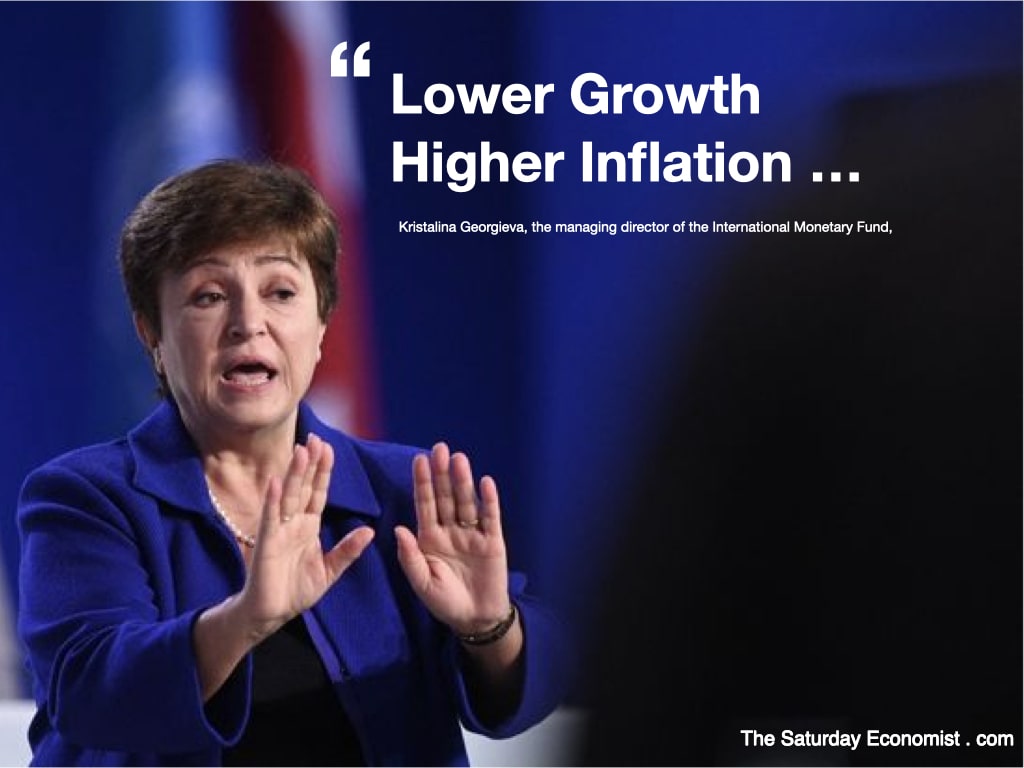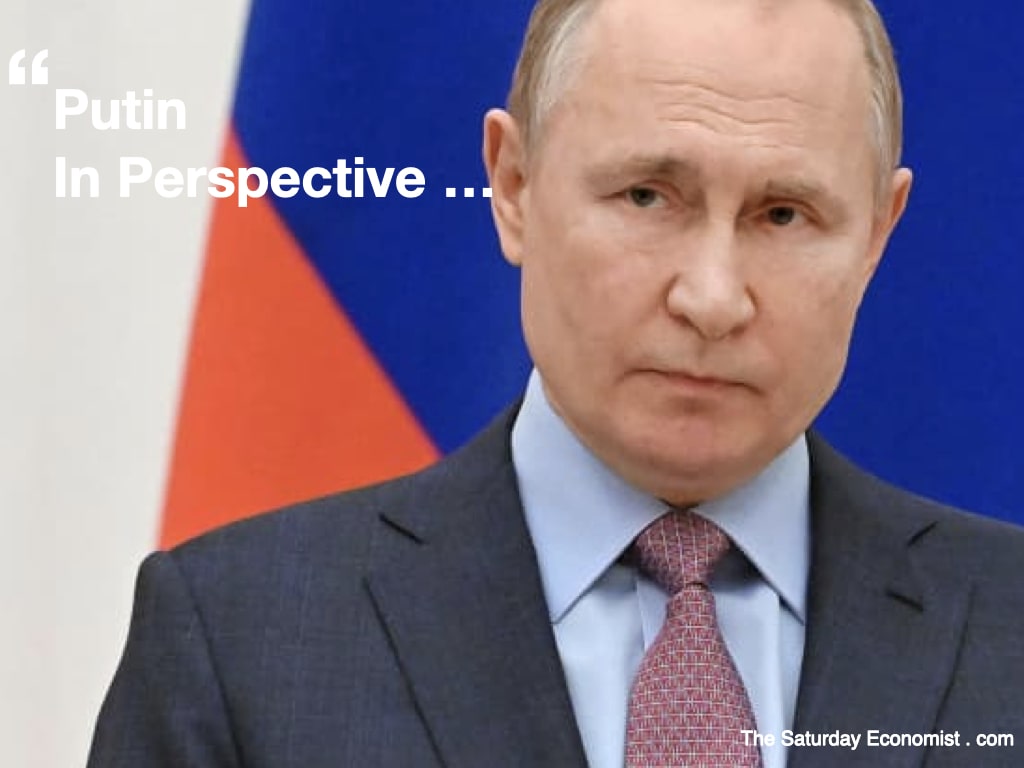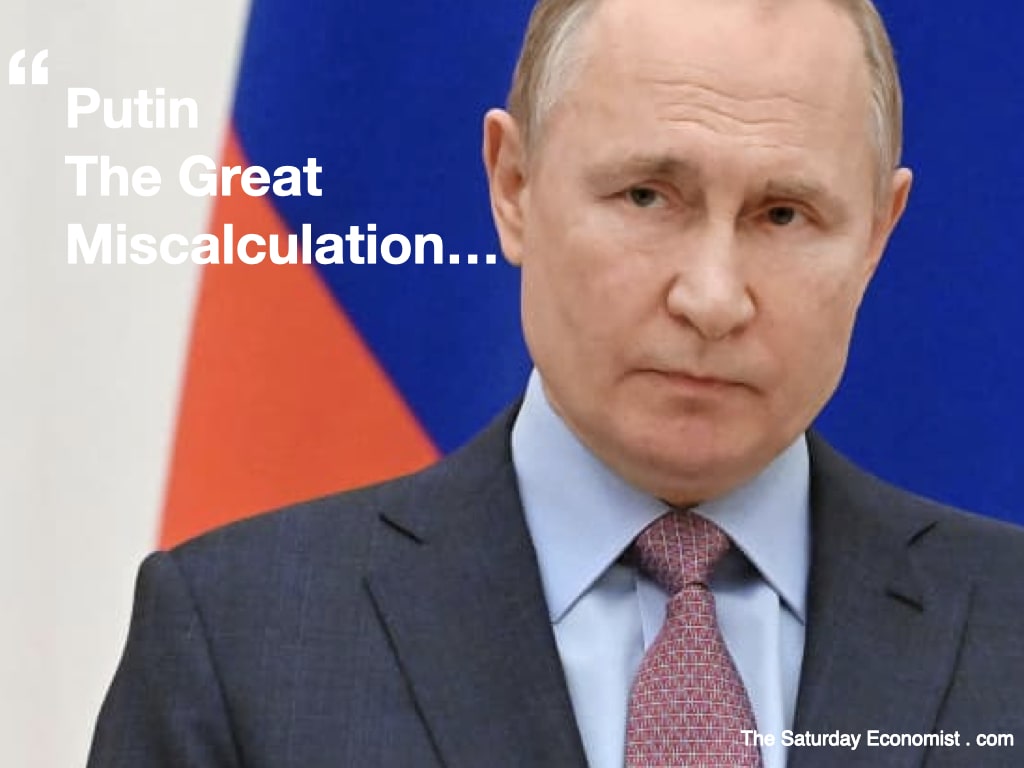|
In January this year, the IMF were forecasting world growth of 4.4% in 2022. This was a modest slow down from growth of around 6.0% in the prior year.
Growth in the U.S. and Europe was expected to be around 4.0%. Growth in the UK and China was expected to be about 4.5%. Concerns were expressed around Covid continuance, energy price rises, supply side disruptions, transport costs, tight labour markets and higher inflation. "Risks to the global baseline are tilted to the downside". The IMF stated. "The probability of a major natural disaster remains elevated". Then in March, Russia invaded Ukraine. Sanctions were imposed on Russia. The ruble collapsed by 30%. Domestic interest rates were hiked to 20%. Capital controls were imposed. The Iron Curtain was redrawn albeit with a gas leak for now. The concept of Cold War returned. Moscow placed on ICE, a policy of Isolation, Containment and Exclusion in prospect. So What Now of World Growth? In our Friday Forward Guidance this week, we outline the new monetary framework for the West. On Monday we will confirm our outlook for markets. Higher rates will lead to lower growth, achieving little impact on inflation in the short term. Bond yields are rising, pension deficits will be shrinking. The prospects for equities now positive, following the sell offs in Asia, North America and Europe. The Economist Intelligence Unit suggested this month, the impact of the war will be a loss of some $400 billion dollars this year. That equates to a loss of 0.4% of GDP. The downside, however, could be as much as a full one percentage point or $1 trillion dollars. "The economic impact of the conflict will be felt mostly in Ukraine and Russia. Both will experience sharp recessions this year. Those eastern European countries most exposed to trade with Russia, such as Lithuania and Latvia, will also take a hit from the conflict. Elsewhere in Europe, the EU will suffer from an energy, supply-chain and trade shock." Oxford Economics suggests the impact on global GDP will be muted in Asia and North America. The impact will be greater in Russia and Europe. The loss of global output this year is expected to be 0.6% in 2022 and 1.1% in 2023. NIESR are more bearish. Using NIGEM, the global econometric model, NIESR suggests the impact of the war in Ukraine could reduce the level of Global GDP by 1%. That's about $1 trillion dollars. The conflict would also add some 3% to global inflation this year and 2% next. Country Forecasts Our own simulations suggest world growth will be 3.5% this year. This is based on changes to the January IMF outlook as follows. U.S. growth is downgraded to 3%, slightly above the FOMC forecast this week of 2.8%. In China, the IMF forecast of 4.8% is upgraded to 5.0%. This is a slight discount to the official growth target of 5.5% in the current year. Covid restrictions and lock downs in Shenzen and Jilin could impact further on the full year outlook. In Europe, Germany will be the most severely affected. The overall shock to growth is expected to be between 0.5% and 1.0%. We will update our UK forecasts in greater detail next week. The IMF were forecasting UK growth of 4.7% this year following growth of 7.5% last year. This month, the HM Treasury summary of forecasts for the UK economy, suggested growth would slow to around 4% this year. It would appear to be a fair bet for the moment. We await with interest the OBR updates next week. So what of Inflation ... In the West, we were already braced for the impact of rising energy and commodity prices. Oil Brent Crude trading at $98 dollars a barrel in February, gas prices spiking at over $5.00 per therm. Shipping costs on the rise again. Gold always an attention grabber, testing $2,000. We didn't really take a look at wheat prices hovering at $800 per tonne. Then came the leap to $1,300 as the tanks rolled into "The Bread Basket of Europe". The OECD chart marks the spike in commodity prices following the conflict in Ukraine. Energy features along with the hike in metal prices, Nickel, Platinum and Palladium. Wheat and Corn are high on the list. [Not featured are the increases in rape seed oil and fertilizer.] Russia and Ukraine account for almost 30% of the world’s wheat exports. Russia supplies 16% of the world’s fertilizer. Ukraine is a major producer of neon, a key input for the production of semiconductors. Fears abound Russia could more aggressively restrict key exports to Western countries of grain, titanium, palladium, aluminum, nickel, timber, and oil and gas. Russia is a vital supplier. Restrictions would send shock waves throughout the global economy. Concerns are rising over food and famine. Turkey, Egypt, Israel, Tunisia, Thailand, Indonesia, Greece and Morocco are particularly dependent on Russia and Ukraine for imports of grain. In Egypt and Turkey the dependency is over 70%. So what of inflation? The OECD expects a substantial hit to inflation in the current year. For the world economy as a whole, the increase is expected to be 2.5%, in Europe just over 2%. In the USA, the impact slightly more muted at 1.5%. In the UK, the Bank of England now expects inflation to peak at around 9%, compared to just over 7% prior to the invasion. In Russia, inflation is expected to surge to between 20% and 30%. The pressure on Putin is increasing. The President is lashing out at traitors and fifth columnists in Russian society. Arrests of key players in military and FSB are underway. In Ukraine, the death toll continues to mount. The shocking news clips continue ... the rise in inflation and lower growth, a modest inconvenience in comparison to real hardship ... That's all for this week. Next week we will focus on the UK Economy following the Chancellor's Spring statement and the ORR updates. Don't miss our Monday Morning Markets update out on Monday. Markets rallied this week. The overall bounce was around 5%. Hang Seng bounced but still has a "buy in bundles" tag. China is softening the stance on tech. It is time to take a look again at mainland stocks. Gold slipped to $1,929, Oil Brent Crude closed at $107 dollars. Sterling traded up against the Dollar. Bond yields strike our first level target. More in bond yields to follow by the end of the year ... Have a great weekend, John
0 Comments
Joe Biden made it clear this week, NATO will not go to war with Russia to defend Ukraine. "We are going to provide more support but we will strive to prevent a direct clash [with Russian forces]."
He went on to say, direct confrontation would lead to World War Three, something we must strive to prevent. However, the US would defend every inch of territory of its NATO allies if attacked, no matter the consequences. It was a clear evidence of the resolve of western allies to resist further Kremlin aggression. It's also confirmation, the West needs a little more time to prepare for conflict. World War III is also something President Putin will strive to prevent. Putin knows this would be a war, which he could not win. The numbers just do not add up for Mother Russia. In 2021 the IMF ranked the Russian economy as eleventh largest in the world, squeezed out of the ten by South Korea and Canada. A GDP estimate of $1.6 trillion dollars for the Russian economy, contrasts with a combined NATO GDP estimate of almost $45 trillion dollars. In military spending, it is estimated the Russian economy spent some $48 billion dollars in 2021. That compares with an estimated $750 billion in the same year for Uncle Sam. Germany has now vowed to increase spending to over $80 billion. Combined NATO spending last year on military defense was over $1 trillion dollars. That's twenty to one out spend for the would be aggressor. Ukraine is demonstrating just what can be achieved with a more modest $5 billion spend. The beleaguered country will continue to receive substantial support in funding and military supplies as the war drags on. Russian military has demonstrated the vulnerability of infantry and armed vehicles to drone and anti tank attacks. The importance or air superiority critical to support of ground forces. In Putin's world, tanks are used in World War III, as cavalry was initially employed in World War I, with US jets as escort. EU leaders have announced their intention to collectively rearm and become autonomous in food, energy and military hardware in a Versailles declaration that described Russia’s war as “a tectonic shift in European history”. Putin and Russia face a period of Moscow on ICE. Isolation, Containment and Exclusion. The Iron Curtain is closing, albeit with a gas leak for now. Slowly but surely the leaks will be plugged. More importantly, in the short term, the future of the people of Ukraine is in the balance. We continue to be deeply shocked and saddened as the terrible events unfold ... The Ukraine Battle Map ... So how will events develop in Ukraine"" Putin has made it clear this is not a war, it's a "Special Military Operation". Foreign Minister, Sergey Lavrov, stated this week, "We did not attack Ukraine". Of course not, presumably it was more of a joint military exercise with close neighbours. It was a process of invasion, annexation and installation of a puppet regime. The process has failed. Lavrov also went on to say, if there is a World War III, it will be nuclear. Putin has made several threats of nuclear force in recent weeks. He would consider wielding atomic weapons if NATO forces got directly involved in defending Ukraine. Russia run a similar playbook in 2014. As Putin invaded Crimea and eastern Ukraine’s Donbass region, he said, “Russia is one of the leading nuclear powers. It is best, not to mess with us.” Russian officials relayed similar threats to Western leaders. Russia did not put its nuclear forces on high alert. Putin later bragged that he almost did. So how will this end? Annexation of Ukraine unlikely. Partition of Ukraine possible. The lines may be drawn between Kyiv and Odessa or East of the Dnipro River or a reversion to the "Status quo ante bellum". Ukraine independence assured, Moldova Sweden and Finland may then seek security with NATO. The Cold War returns. Europe develops an alternative energy policy. Energy costs rise, food costs rise, metal costs rise. Inflation rises, growth slows, recession avoided, perhaps not for Putin. This will be the last in our trilogy on Putin. Next week we really will try to put some numbers on growth and inflation ... Thanks for Reading ... Don't miss our Monday Morning Markets update out on Monday. Markets steadied this week, European stocks rallied. Most moved into oversold territory. Hang Seng had a "buy in bundles" sign as markets fear the worst for China tech. Gold slipped below $2,000, Oil Brent Crude closed at $111 dollars. Sterling slipped further against the Dollar. Have a great weekend, John Deeper and Deeper ...
At the NATO summit last year, the West gave encouragement to Ukraine to join the Alliance. Little thought was given to the reaction of Moscow to such a potential tectonic shift in the balance of power in the East. In November last year, the U.S. and Ukraine signed the Charter of Strategic Partnership. America affirmed Kyiv's right to pursue membership of NATO. It was a step too far for Putin. We outlined last week, the importance of buffer states from the Black Sea to the Baltic, from Crimea to Kalingrad, to an increasingly threatened Mother Russia. For Putin, the Charter was indeed a step too far. Preparations immediately began for Russia's so-called "Special Military Operation" in Ukraine. Ukraine has long held a special place in Putin's buffer zone. In 2007 at the Munich conference, Putin had made it clear, his speech was a rant against Ukraine ever joining NATO. In 2021 he wrote "Ukrainians and Russians are one people", never to be separated. Let's face it, the Ukrainians have long held a special place in Mother Russia. Millions were allowed to die from starvation in the early 1930s as Stalin imposed his authoritarian, agrarian adventure, at the cost of so many innocent lives. Putin believed war could be avoided simply by the show of force along the Ukrainian borders to the North, South and East. Zelensky's government would bow to the threat of invasion by such a great global power. Kyiv would reach an accommodation with Moscow to avoid large scale destruction. Putin's ring of steel would be guaranteed. His reputation inscribed in history along with Ivan the Terrible. Special Thanks to Robert Service "The Two Blunders That Caused the Ukraine War" Interview with Tunku Varadarajan Wall Street Journal 5th March 2022. The Great NATO miscalculation ... Putin underestimated Zelensky. He seriously underestimated how the leaders of the "Free World" and NATO would react. Perhaps it was an easy mistake to make. Putin had enjoyed four years of laissez-faire with Trump. The U.S. President had demonstrated his disdain for democracy and the admiration of President Putin. A President in power twenty years had a certain appeal, especially with the bonus of a little crony corruption on the side. Trump had also demonstrated indifference to the NATO Alliance. He berated close allies with long over due debts to Uncle Sam. More votes were on offer at home from an aggressive stance with China. Trump was struggling with the Thucydides trap. The rise of Sparta ensured war with Athens was inevitable. So too it was said, the rise of China would lead to inevitable war in the South China Sea. Joe Biden appeared to offer even less of a threat. Walk tall and carry a big stick. Biden struggled to walk tall carrying a walking stick. In Germany, the retirement of Angela Merkel would create a leadership vacuum. The Germans were hooked on Russian Gas. Nord Stream two would guarantee a permanent fix. The European Union had been dealt a serious blow with the abdication of Britain from the economic alliance. Putin would have been unimpressed by Defence Secretary Williamson's, now Sir Gavin Williamson's remarks that Russia should go away and shut up. The Tanks Rolled over the Border The Tanks Rolled over the Border and into the abyss. Zelensky held firm. The Ukrainian people defiant. The invasion stalled. The Russians upgraded the levels of civilian attacks and large scale destruction. It is like watching a 1930's news clip. The annexation of a sovereign state, millions of refugees feeling across Europe, a dictator unchallenged at home, the West prepares for war, the threat of nuclear detonation returns. Sanctions imposed on Russia and the Oligarchs. Russian central bank assets frozen. Putin achieved what Trump could not. The Germans vowed to increase spending to meet the NATO commitment. Georgia and Moldova apply for EU membership. Sweden and Finland may join the alliance. Higher inflation and lower growth in prospect. Oil trades at $120 dollars his morning. Commodity prices are soaring. Russian stock markets are collapsing. The Russian economy will be badly damaged in the process. In our next update, we will try to pull together the forecasts for growth and inflation in the year ahead. Meanwhile the tragedy in Ukraine continues ... |
The Saturday EconomistAuthorJohn Ashcroft publishes the Saturday Economist. Join the mailing list for updates on the UK and World Economy. Archives
July 2024
Categories
All
|
| The Saturday Economist |
The material is based upon information which we consider to be reliable but we do not represent that it is accurate or complete and it should not be relied upon as such. We accept no liability for errors, or omissions of opinion or fact. In particular, no reliance should be placed on the comments on trends in financial markets. The presentation should not be construed as the giving of investment advice.
|
The Saturday Economist, weekly updates on the UK economy.
Sign Up Now! Stay Up To Date! | Privacy Policy | Terms and Conditions | |



 RSS Feed
RSS Feed